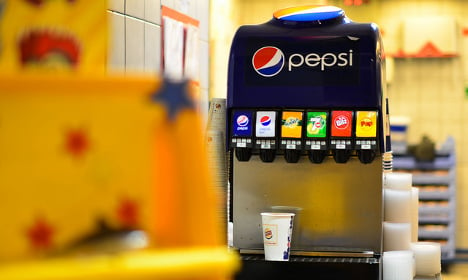MPs debating France's controversial package of health reforms voted through an amendment to ban the refills late on Wednesday night.
The ban would apply to all soft drinks or soda “fountains” (see pic above) in places open to the public, including fast food-chains and restaurants.
The law is designed to help tackle obesity levels with sugary soft drinks seen as one of the major causes of the condition.
In the wording of the amendment that was put forward by the centrist UDI MP Arnaud Richard: “It is the role of the law to fix a framework to protect the population against commercial competition which aims to make something free to entice customers and encourage them to consume unhealthy products excessively.”
A ban on unlimited refills has won the backing of France's Health Minister Marisol Touraine.
“This habit is common in other countries and it is increasingly taking hold in France. I understand it can be attractive for young people who are offered unlimited sugary drinks, which contain an excessive amount of sugar or sweeteners,” said Touraine.
In September 2014, the free refill, a must in most American restaurants, was launched in Quick, one of France’s most popular fast-food chains.
It normally involves customers being given an empty cup with their food and they are then free to serve themselves from the “soda fountains”.
While KFC quickly introduced the same scheme, McDonald's in France continued to make customers pay for their drinks at the till.
The list of soft drinks that the ban would cover is to be published at a later date by ministerial decree, whilst the controversial health bill must also pass through the Senate before it becomes law.
'France must be an example to the world'
France's new national nutrition programme aims to reduce children’s consumption of more than half a glass of fizzy drinks, by 25 percent. The programme stresses that “water is the only essential drink” and should be made freely available.
France has long been at the forefront of banning products it considered harmful for the health, especially in schools.
In 2004, vending-machines were banned schools and only machines selling items of fruit and water were allowed to be in education premises.
Then in 2011 the government banned ketchup from school cafeterias and said chips or French fries could only be served up once a week.
“France must be an example to the world in the quality of its food, starting with its children,” said the then agriculture and food minister Bruno Le Maire at the time.
Figures from the market researcher Euromonitor in 2011 showed the French consume fewer soft drinks per person than any other country in Western Europe apart from Portugal.
While in the UK people drank an average of 84 litres of fizzy drinks per year, the average in France was only 45 litres.
The Americans consume four times as many soft drinks than the French, with an average of 170 litres a year.
In 2012, former New-York mayor Michael Bloomberg tried to prohibit the sale of soda in containers larger than half a litre but the Supreme Court ruled the plan unconstitutional.
by Chloe Farand



 Please whitelist us to continue reading.
Please whitelist us to continue reading.
Member comments